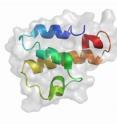Penn study shows immune system can hurt as well as help fight cancer
Related images
(click to enlarge)
Researchers at the University of Pennsylvania School of Medicine have found that some proteins of the immune system can promote tumor growth. Investigators found that instead of fighting tumors, the protein C5a, which is produced during an immune response to a developing tumor, helps tumors build molecular shields against T-cell attack. These findings appeared online this week in Nature Immunology. C5a is part of the complement system, one of the body's immune defenses against pathogens. When activated, the system's proteins rid the body of microbes and foreign cells. Many cancer treatments are aimed at boosting the immune system to kill tumors.
"Until now, everyone thought that the complement system was there to eliminate tumor cells. We found that in some conditions, the complement system can promote tumor growth, depending on the specific tumor and the specific environment in which the tumors are developing," says John Lambris, PhD, the Dr. Ralph and Sallie Weaver Professor of Research Medicine.
However, Penn researchers found that in a mouse model, activation of the complement system in tumor tissue leads to the generation of C5a, which recruits myeloid-derived suppressor cells (MDSC) to tumors. These MDSCs block the function of CD8+ T cells, which would normally dismantle a tumor.
Researchers also found that blocking the C5a receptor on cell surfaces impairs tumor growth at the same rate of Paclitaxel, a chemotherapy drug. This discovery could lead to new cancer treatments with far fewer side effects than chemotherapy, surmise the investigators.
"Researchers are trying to introduce immune therapies and anti-tumor vaccines, but most of these vaccines fail," says Lambris. "We show in this study a possible mechanism how to overcome this problem." Lambris and his team are conducting studies that apply the approaches outlined in this paper to five models of cancer.
Source: University of Pennsylvania School of Medicine
Articles on the same topic
- Children's National researchers develop novel anti-tumor vaccineThu, 2 Oct 2008, 16:35:58 UTC
Other sources
- Novel Anti-tumor Vaccine Developedfrom Science DailyFri, 3 Oct 2008, 3:28:24 UTC
- Researchers develop novel anti-tumor vaccinefrom PhysorgThu, 2 Oct 2008, 18:21:23 UTC
- Immune System Can Hurt As Well As Help Fight Cancer, Study Showsfrom Science DailyWed, 1 Oct 2008, 18:07:27 UTC
- Study shows immune system can hurt as well as help fight cancerfrom PhysorgMon, 29 Sep 2008, 21:07:09 UTC
